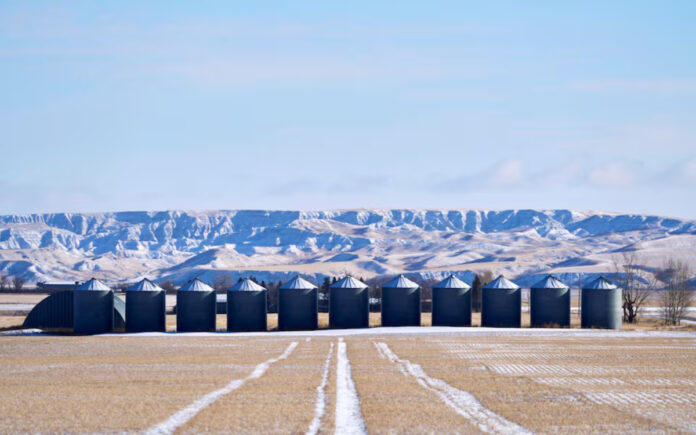Regina, Saskatchewan: Bill Prybylski, a Canadian farmer from Willowbrook, Saskatchewan, had planned to purchase a new tractor with the earnings from crops he sold to two grain companies in early 2024. However, after delivering his grain, both companies declared bankruptcy, leaving him unpaid and short by C$165,000 ($113,487). Now, without the funds, his hopes of replacing his old tractor are on hold.
Prybylski is just one of hundreds of Canadian farmers who have faced delayed or unpaid crop payments as an increasing number of grain-buying firms collapse under financial pressure. The situation, driven by persistent drought conditions and falling commodity prices, is exposing significant gaps in Canada’s farm safety net.
Unprotected Farmers Left Struggling
Despite Canada being the world’s top canola producer and the third-largest wheat exporter, the financial struggles of grain buyers are compounding the difficulties for farmers, who are already bracing for potential U.S. tariffs. Many are now relying on credit lines to cover losses while preparing for the next planting season.
“Where do we cut our expenses? Or how do we get more revenues to do the things we need to do?” Prybylski questioned, as he faces upcoming costs for fertilizer, seed, and fuel.
Farmers often sell crops to companies operating storage terminals, merchants, or livestock producers, typically receiving payments within weeks. However, when a buyer goes bankrupt before paying, farmers—who have already incurred high production costs—are left exposed.
The Canadian Grain Commission (CGC), a federal agency regulating crop transactions, provides some financial protection by requiring licensed grain companies to post security deposits. The CGC can use these funds to compensate unpaid farmers when a company fails. In 2024 alone, the CGC managed four company failures—the highest number since at least 2001—compared to an average of zero or one per year.
However, some bankrupt companies were unlicensed, leaving affected farmers without recourse. Alberta farmer Christi Friesen nearly lost C$75,000 when grain buyer Agfinity attempted to delay payment for her pea shipments. While she ultimately received her money with interest, Agfinity filed for bankruptcy on November 25.
“I needed to fight,” Friesen said. “I kept being a pain in the ass.”
The revelation that some failing companies were unlicensed and others lacked full insurance coverage has further alarmed farmers.
“This situation has fully exposed that we are not secure,” said southern Saskatchewan farmer Cherilyn Jolly-Nagel.
Regulatory Challenges and Farmer Protections
By law, companies buying crops directly from farmers must be licensed with the CGC, with few exceptions. However, the agency cannot directly enforce penalties—it must refer cases to the Public Prosecution Service of Canada, which decides whether to act. According to CGC spokesperson Christianne Hacault, no such complaints have been filed in at least seven years.
“We know there are gaps,” Hacault acknowledged, adding that the CGC is currently consulting with farmers on improving its protection system.
The CGC also requires farmers to report non-payment within 90 days to qualify for compensation. In some cases, even licensed firms fail to post adequate security, leaving farmers partially compensated.
The federal agriculture minister’s office, which oversees the CGC, did not respond to requests for comment.
Also Read | ILO: Latin America Sees Job Growth, But Inequality Widens
Drought and Economic Pressures Intensify the Crisis
Western Canada’s Prairies have faced four consecutive years of drought, with some farmers experiencing the worst conditions since the 1930s Dust Bowl. According to insurance agencies in Alberta and Saskatchewan, crop insurance claims from 2021 to 2024 surged sevenfold compared to the previous four years.
Unlike some countries where large multinational companies dominate grain markets, Canada has numerous small grain buyers, brokers, and merchants—many of whom are struggling to survive.
In the U.S., farmers have also faced declining crop prices, but better growing conditions have helped sustain revenues. Some states regulate grain companies, offering farmers additional protection against non-payment, though safeguards vary by region.
Also Read | US Tariffs on Canadian Steel and Aluminum Will Cost American Jobs, Says Trudeau
Survival Strategies and Industry Fallout
Even companies that have avoided bankruptcy are feeling the strain. In September, North West Terminal (NWT), a farmer-owned grain handler in Saskatchewan, announced it would halt grain purchases until at least July to prevent financial losses.
“We’ve seen some significant headwinds and … margins that aren’t covering costs,” said NWT CEO Jason Skinner.
For some farmers, the financial burden is becoming unbearable. Saskatchewan farmer Kelly Arthurs lost C$50,000 after grain buyer LSM Grain picked up two truckloads of red lentils in May but never paid. The CGC revoked LSM’s license in July, but by then, Arthurs had already endured months of stress fighting for his money.
A bankruptcy filing showed that 17 farmers owed a combined C$842,000 by LSM missed the 90-day complaint window and will not be compensated—including Prybylski.
Another bankrupt buyer, Global Foods and Ingredients, also owed Prybylski money. While he submitted his complaint in time, he only received 75% of his due payment because the company had posted insufficient security.
“I felt so much stress from months of fighting to get paid that I may quit farming,” Arthurs said. “It’s time to retire.”



